#dr who meta
Explore tagged Tumblr posts
Text
everytime a spaceshp blows up over earth in dr who i think of the space junk. that can't be safe.
4 notes
·
View notes
Text
As much as I like the modern showrunners, as important of an episode that The Star Beast was and having a female doctor was, I really do wish they had new showrunners. The same 3 cis white men cannot create all the diversity this show deserves im sorry. A woman should have written 13 (women written episodes were the best of the run). im not a poc or trans so i cant claim that but idk i feel like Issues will arise from the same cis white man who said that racism doesn't exist if you don't think about being black is back running the show. I am scared a little bit!
2 notes
·
View notes
Text





#the way i screamed at this part#they FUCKED#dw spoilers#dw#doctor who#doctor who spoilers#ncuti gatwa#jonathan groff#rogue#15th doctor#fifteenth doctor#the doctor#dr who#dw s14#dw meta#1k
4K notes
·
View notes
Text


dr simptio anyways isnt aventurines boss form wife material
#AUGHHHH its so SO PEAK HES SO GENDER#what right does this man have to go into everyones lives and snatch their gender#omg imagine a boss form for topaz tho PLEASE FATHER HOYO I'D DO ANYTHING INCLUDING SELLING MY KIDNEY FOR THAT#also the triple fua dps team is genuinely so fun ik i could replace clara with rm/ting but WHO CARES ABOUT META#aventurine#aventio#aventurine honkai star rail#hsr#hsr fanart#honkai star rail#star rail#penacony#hsr penacony#dr ratio#ratiorine#hsr topaz#hsr aventurine
2K notes
·
View notes
Text
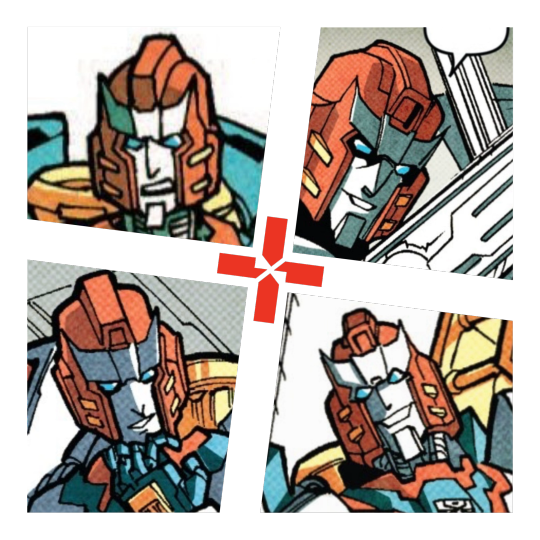
Medic, Maverick, Maniac, Murderer: Understanding Pharma
First thing’s first: I love Pharma, dearly.
In all the time I’ve spent evaluating his character, I’ve mainly focused on what can be worked out about who he is as an individual: his core sense of self, psychological drives, subjective worldview, etc.
When all else is stripped away, who is Pharma?
This treatise is the product of obsessing over Pharma, analyzing canon (and extras), and reading as many different perspectives on his character from fans across the fandom as I could find. The post is long, so for those of you who balk at the thought of reading a shortfic’s worth of Pharma thoughts, feel free to read the TL;DR (Conclusion) at the end and then decide if the full read is worth your time. Also, a premium reading experience is available in the form of the original Google Doc version.
As you read, keep in mind that this is primarily a mix of psychoanalysis, evidence-based examination, and speculation—not moral, ethical, or sociological commentary. The goal is to examine Pharma’s psychological drives and core values, and each of his appearances in the context of those. All other types of evaluation are up to readers.
Now, take your victim blaming-allergy meds (just in case); remove your black-and-white thinking caps; and leave your personal morality lenses at the door.
Psychological Drives & Core Values
Why does Pharma act the way he does? What gives him a reason to keep living? What are his personal priorities?
At the beginning of the Delphi arc, First Aid establishes Pharma as a “control freak” and someone who “thinks he’s an expert on everything.”

Now, First Aid has a habit of complaining about his bosses, but on both points, there’s canon evidence to back them both.
Expertise and Intellect
Throughout the Delphi and Luna 1 arcs, it’s established that Pharma is a skilled and brilliant doctor.
He once performed a 4-way fuel pump transplant, donating his own fuel pump in the process. (see above panel)
Later, he invented a soundbomb that left an echo laced with a virus and invented an antidote to that virus:
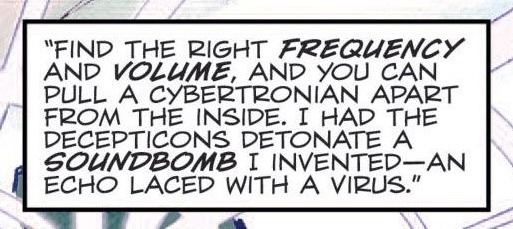
And on Luna 1, he was on the edge of finding a cure for Cybercrosis, based on the fact that Swerve was able to formulate a cure from his notes.
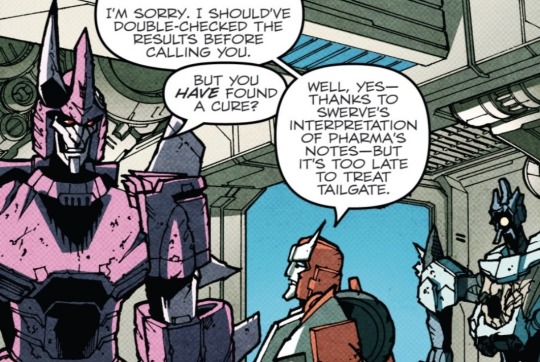
More than being a doctor, Pharma lives for intellectual and scientific achievement as a physician scientist. He feels most alive when he’s able to solve complex medical problems, and when his achievements are recognized by those whose opinion he considers important.
This is Pharma’s 'why.'
And even though he’s arrogant and enjoys praise, it’s not his primary motivation. He doesn’t need it in order to set his mind to whatever he’s interested in, although he’ll seek it from those he values most (i.e. Ratchet).
Pharma sees himself as less of a doctor, and more as a scientific innovator or medical maverick. The practice of medicine is primarily a catalyst for his creativity and intellect; it’s not an end in and of itself like it is for someone like Ratchet or First Aid.
First Aid’s observation of Pharma can be better phrased as, “[Pharma] thinks he’s an expert on everything medical”—because he’s not so driven by achievement and admiration that he’ll grovel at the feet of strangers and get good at something he doesn’t personally find interesting. The only time we see him express a desire for praise is when he’s around Ratchet—someone he holds in high regard for both personal and professional reasons. This makes sense since Ratchet is one of the only people who can give Pharma any kind of competition within what he considers to be his area of expertise.
“Each day we go to our work in the hope of discovering—in the hope that some one, no matter who, may find a solution of one of the pending great problems—and each succeeding day we return to our task with renewed ardor; and even if we are unsuccessful, our work has not been in vain, for in these strivings, in these efforts, we have found hours of untold pleasure, and we have directed our energies to the benefit of mankind.” —Nikola Tesla
Ego
Without question, Pharma has an inflated ego, but having an inflated sense of self doesn’t automatically mean a person is a full-blown narcissist or that they are totally uncaring.
Every personality trait exists on a spectrum. Yes, Pharma is arrogant, but the presence of arrogance doesn’t automatically and completely cancel out all “positive” traits. (For fun, check out studies on Dark Tetrad and Light Triad personality traits.)
People are complex. Arrogance can coexist with genuine kindness, ruthlessness can coexist with deep compassion, etc.
Whether Pharma exhibits genuine kindness is up to each reader’s interpretation of what little canon material exists, but the point is: Pharma’s arrogance doesn’t automatically rule out the possibility of authentic “positive” traits.
Controlling Tendencies
Pharma is comfortable pulling the power card and using it to dump what he sees as uninteresting parts of medical practice on those below him:
“So Fisitron’s writing about the Wreckers’ elbows now, is he?” said Delphi’s Chief Medical Officer. “Come on, First Aid - get to it. You’ve got a Fader in Row 2 downstairs.” He squeezed the air with his finger and thumb. “He’s about this far from shutdown.” —from Bullets by James Roberts
However, there’s nothing in canon indicating he’s power-hungry in a megalomaniacal sense. He’s not Starscream or Megatron; he doesn’t seek political or social power. In fact, he seems perfectly happy hiding away in a lab or medibay by himself so he can direct all his energy toward solving issues and achieving the so-called ‘impossible’ within the field of medicine:
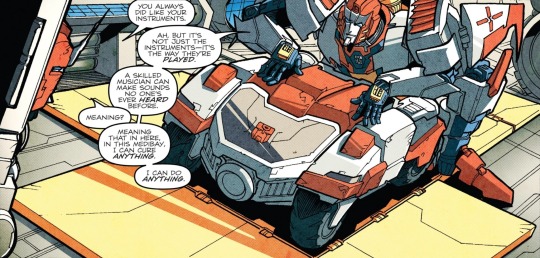
The ways in which Pharma exercises power and control are through his expertise, and his administrative/management skills. That’s it.
Self-confidence
Pharma���s arrogance and controlling tendencies don’t seem to be a mask—like he’s trying to compensate for some sense of lack (in those areas). Yes, he fears failure, and yes, he displays some insecurity when Ratchet questions his competence. But at every other point and in every other way, Pharma is unapologetically self-confident. He’s fully self-assured of his intellectual prowess and problem-solving capabilities; he knows what he knows, and he also knows what he doesn’t know.
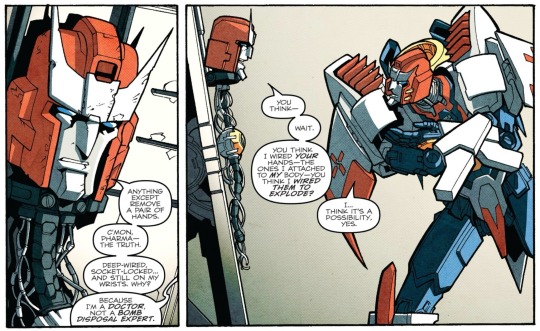
Pharma’s arrogance and desire for control don’t stem from a hidden lack of confidence or a hunger for power on its own. They stem from the fact that he genuinely sees himself as the best person for the work he does. He trusts himself above anyone else to solve problems that come his way—medical or otherwise (within limits).
Elitism vs. Superiority
I’ve always read Pharma as having an elitist attitude, but not in the social stratification sense:
elitist (adj.) relating to or supporting the view that a society or system should be led by an elite.
There’s no evidence that Pharma believes an elite class of people should hold the most power. Instead, Pharma’s “elitism” is actually an individualistic sense of superiority. It’s centered on him alone, and is tied to his capabilities as a physician scientist and surgeon.
Pharma sees himself as the best of the best and makes sure everyone knows it—sometimes through his words, but mostly by his conduct in the field of medicine. This, paired with Pharma’s natural temperament, doesn’t exactly make him socially popular—inside or outside of medicine:
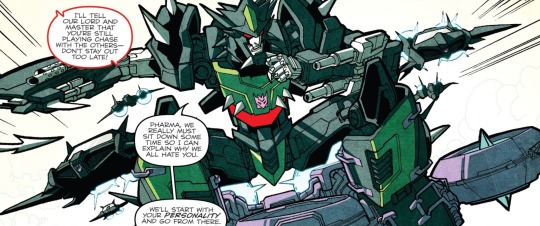
One could argue that the “personality” Lockdown is referring to was a result of all Pharma had suffered at Delphi and Luna 1, but just as easily, one could argue he was always a bit difficult to get along with, and that his traumatic experiences merely magnified his already-present psychological patterns. Personally, I like the latter interpretation because it’s a flaw that makes Pharma a more interesting character no matter his mental state.
Everyone reacts differently to real and perceived social rejection. Some are so concerned about it that they’ll try anything to belong; others genuinely don’t care, and they continue as usual; and still others cope by shifting their mindset and developing a sense of pride in being an outsider.
There’s no evidence for this in canon, but I believe it’s within reasonable characterization boundaries to headcanon Pharma as being in the second or third category.
With either of those two mindsets, a sense of superiority can develop, or even be an inciting factor. Either someone sees themselves as genuinely superior to the majority and doesn’t mind when this alienates them from people, or they convince themselves they’re superior because the pain of accepting they were rejected for who they are is too much to handle.
Whatever the case, the point is, having an “elitist” attitude isn’t necessarily rooted in a sociological or ideological belief. Sometimes, individuals just see something in themselves that—to them—justifies a sense of personal superiority. A quick glance at Pharma’s canon appearances makes it clear he holds such a view of himself, at least to some degree.
Morality and Compassion
When Pharma first shows up in canon, he’s working at the New Institute. A lot of questionable things took place there on a regular basis—things Pharma would have been aware of, to some degree. However, his presence at the Institute doesn’t automatically mean he agreed with everything happening. Depending on how strongly someone feels about something, some people are content to disagree in silence. Not everyone who seeks employment considers it a priority that the establishment they work for aligns perfectly with their moral values. After all, there are other reasons to take a job: financial benefits, exclusive educational and career opportunities, pure convenience, etc.
I’m not here to say either way whether Pharma’s willingness to turn a blind eye to the events at the New Institute was wrong or right; that’s up to each reader to decide for themselves. However, Pharma’s choice to remain employed at the Institute for some time can say something about him as a character: his priority as a doctor and person is not to take care of everyone he encounters, or to act as some kind of moral or ethical authority.
This isn’t to say Pharma won’t ever stand up for something he regards as right or push back against something he sees as wrong, “off screen.” It’s just that everything in canon points more to a tendency to choose his battles instead of acting immediately on any moral sense the way someone like Optimus or Ratchet might.
This also isn’t to say Pharma doesn’t care about saving lives, but from what little is shown of him before Delphi, it’s hard to say how much he cared. Ratchet confirms later that Pharma was an excellent doctor for most of his life, but all that tells us is he was an excellent doctor; it says nothing about his internal attitude toward his work or patients.
However, inferences can be made based on doctors in our own world:
Being a doctor—especially one in trauma care—is far from easy. It takes a lot out of a person, and there are very few people who last in the profession for a long time. Most medical professionals fall into one of the following categories:
People possessing a strong will that’s coupled with an unwavering passion for taking care of others (the public’s favorite)
People who naturally have, or develop, an ability to switch their empathy off and on at will, or build walls around it—also possessing a strong will (the ideal)
People who naturally have a limited capacity for empathy (the one the public hates to acknowledge)
People with a strong social and professional support system (the necessary, but underutilized and underappreciated factor)
Of course, even if a person has one or more of the above, burnout can and does still happen, but individuals who have at least one have the best chances of surviving and thriving amidst the demands of the majority of medical professions.
As far as is shown in canon, Pharma never had a strong support system—either circumstantially or by choice—so something else was keeping him in medicine.
Pharma shows concern for both Tumbler (Chromedome) and Hubcap:
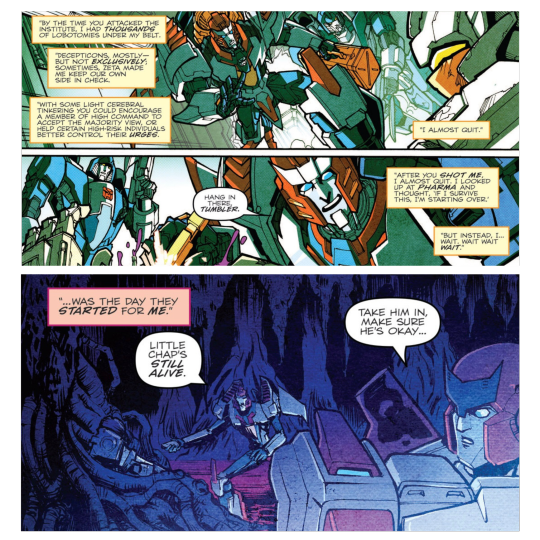
But even though he obviously cared enough to step in, neither instance makes a strong case for a capacity for empathy beyond the “average” or “norm.” Performing a job well is a lot different from being personally invested in the work.
Based on everything up to this point, and this later comment from Pharma, about Ratchet…
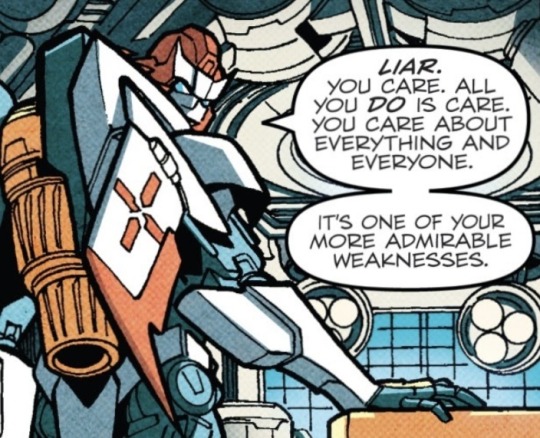
…Pharma has probably never shared the same I-care-about-everything-and-everyone view of the world. Instead, it’s more likely that Pharma holds a more rational view of his work and patients.
One of the first things learned in medicine, especially in trauma medicine, is that you can’t help or save everyone, and to hold yourself to that standard can destroy you quickly if you have a certain temperament or lack healthy boundaries for your empathy.
“There are times when it may seem as though I view sick or injured people not as living, breathing humans with feelings and emotions and people who love them, but simply as cases, as problems to be solved. And that is absolutely true. It's not that I don't have empathy, but the hard fact is that as a doctor, and especially as a trauma surgeon, too much empathy can get in the way of your job and cause you to make decisions based not on sound medical judgment but on your own emotions. Sure, I've seen things that even years later can still make me choke up when I think of them: a little girl shot and killed, a shattered young Marine who shouldn't have died but did. But you can't choke up in the ER or the operating room. To be effective as a trauma surgeon, you have to put a layer of Kevlar around your heart.” —Dr. Peter Rhee, Trauma Red: The Making of a Surgeon in War and in America’s Cities*
Pharma may have learned this difficult truth earlier than Ratchet and developed a practical way of managing his empathy that comes across as “cold.” He may have always had an ability to put up walls around his spark. Or, he may have always had little to no capacity for empathy.
The fact that the morality lock on Tyrest’s portal prevented Pharma from passing through proves he felt guilty for what he’d done, and JRO confirmed this. Therefore, it’s safe to assume Pharma had some level of empathy for his former patients, suffering moral injury when he felt he had no other option but to start killing them.
Still, looking at Pharma’s psychological drives and his behavior throughout canon, it’s clear compassionate care and morality are subordinate to his other values and interests.
*I highly recommend this book, and learning about Dr. Rhee in general. He’s a huge inspiration of mine, and one of my main sources of inspiration when writing Pharma. Level-headed and capable, strong-willed, selectively empathetic, an excellent scientist, etc. He lives for the thrill of practicing medicine both on the floor and as an expert in his field who pushes trauma medicine to new heights through his research. He also takes great pride in his hands. Seriously—the man spent an entire paragraph and a half talking about his “good hands” and how they were one of two reasons he decided to go into trauma surgery. The other reason was that he “liked action and excitement, liked the feeling of being able to walk into a tough situation and take control.” (Sounds familiar…)
Delphi
First thing’s first: we don’t know how much Pharma did or didn’t know about the DJD before agreeing to take the Delphi assignment.
That far into the war, he would have known something about the DJD and their ways of terrorizing traitors and Autobots, but for whatever reason, he took the assignment anyway. Perhaps Prowl assured him the situation on Messatine would be monitored and that the security team would be enough. Perhaps he underestimated the DJD’s capabilities, or scale of territory, and thought he would be able to handle things on his own. Perhaps Prowl gave him no choice. Maybe it was all of these and more.
Whatever the case, according to JRO, Pharma didn’t hate Delphi before the incident with the DJD.
Word of god remains a touchy subject in fandom, but in this case, it’s important because it says two things:
The DJD left the Delphi medical team alone for some time.
Being on the edges of DJD territory didn’t automatically mean isolation and harassment by their hand.
On the second point, First Aid was free to come and go from Messatine as he pleased, seeing as he attended a medical conference at Kimia five years into his assignment at Delphi:
Five years ago [mid-Delphi assignment], the leader of the Wreckers had cornered him at a medical conference at Kimia, the space station that doubled as a weapons research facility. —from Bullets
And five years after that, he was able to not only contact Springer without delay about one of Agent 113’s bullets he’d discovered in an Autobot badge…
He raced upstairs to his computer terminal and typed in a certain frequency code for the second time in his life. A face appeared on the screen and grinned. “It’s me,” said First Aid. “And you're never gonna guess what I’ve got for you..!”
…but he was also able to meet up with Springer to hand off the bullet:
“Your friend has a funny way of making contact,” First Aid had said when he’d got in touch three days earlier, and he was right.
It’s not known if this handoff happened on or off world, but either way, the DJD didn’t interfere.
At some point, Tarn set his sights on Pharma and the Delphi team. Knowing the DJD, one can only imagine what Tarn used to show off his team’s capabilities and convince Pharma the best option was to cooperate.
In striking a deal with Tarn to keep the DJD away from Delphi, Pharma established his territory and ensured his continued security and the safety of his staff. As long as Tarn got his T-cogs, Pharma could continue on in relative peace. He could work his magic on bots that ended up at Delphi, carry out his management duties, and work on whatever projects or research he may have been conducting in his free time.
For whatever reason, after he first came into contact with Tarn, Pharma didn’t call for help. Communications were still operational, as Pharma wouldn’t have suggested contacting High Command about the Duobots if the team was aware of any comm malfunctions:
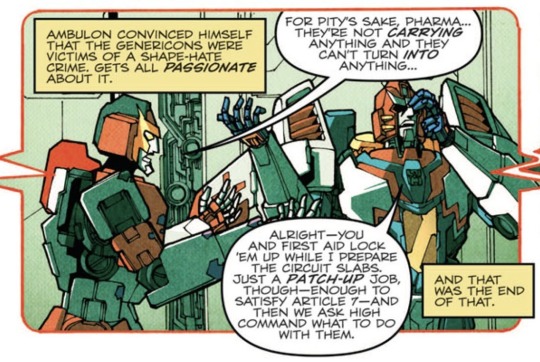
Also, First Aid later confirms that communications were fine until the Big Bang (soundbomb detonation):
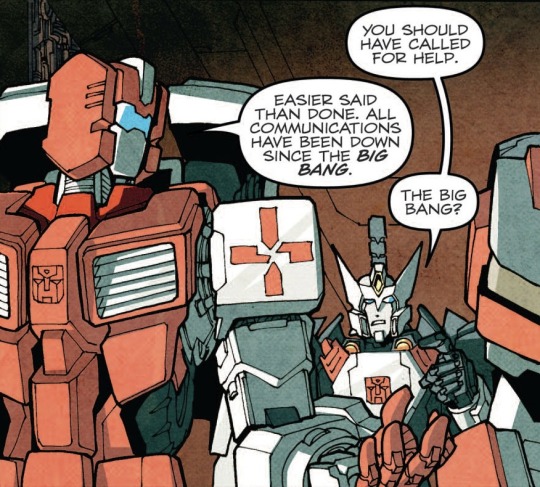
It’s always possible the DJD was monitoring the radio waves, but secure subspace frequencies exist, such as the Datalog Network First Aid used to send the datalog containing the death statistics:

Speaking of which, assuming First Aid sent the datalog with the statistics right when things started to get ‘weird,’ and before the Big Bang shut down comms, it only took—at most—a few days for them to reach Ratchet and Swerve on the Lost Light:

But back to Pharma not calling for help: for all of Prowl’s intel, contingency planning, and fretting over the security of Autobot territories, I find it hard to believe he would have stuck an Autobot medical team on the fringes of DJD territory without giving them some means of securely contacting the outside in case of issues.
But even if Prowl didn’t give Pharma a secure way to contact him or anyone else, and even if Pharma was convinced the DJD was monitoring regular communications, there were other ways he could have reached out for help. After all, the team wasn’t alone on Messatine. Like Pharma said, Prowl continued to send bots to defend the nucleon mines:
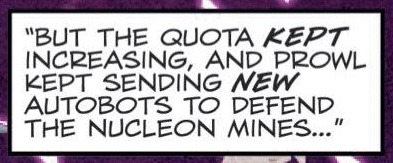
The Autobots had been mining nucleon for millions of years at this point, so I doubt the mined nucleon was just sitting in storage on Messatine; shipments of the stuff would have been sent off-world to wherever the Autobots needed it. Why not send a message for Prowl with someone leaving with one of those shipments? A message meant only to be sent over a call when absolutely certain they were out of range of the DJD’s potential monitoring.
Or, why not order in off-world medical supplies and send a message back with the delivery bot(s)?
There are two possible answers to this. One takes into account JRO’s word on the subject; the other is more intricate and speculative on my part, but it leads to the same place. So whatever your stance is on the validity of word of god, there’s an answer for you.
Answer one (word of god)
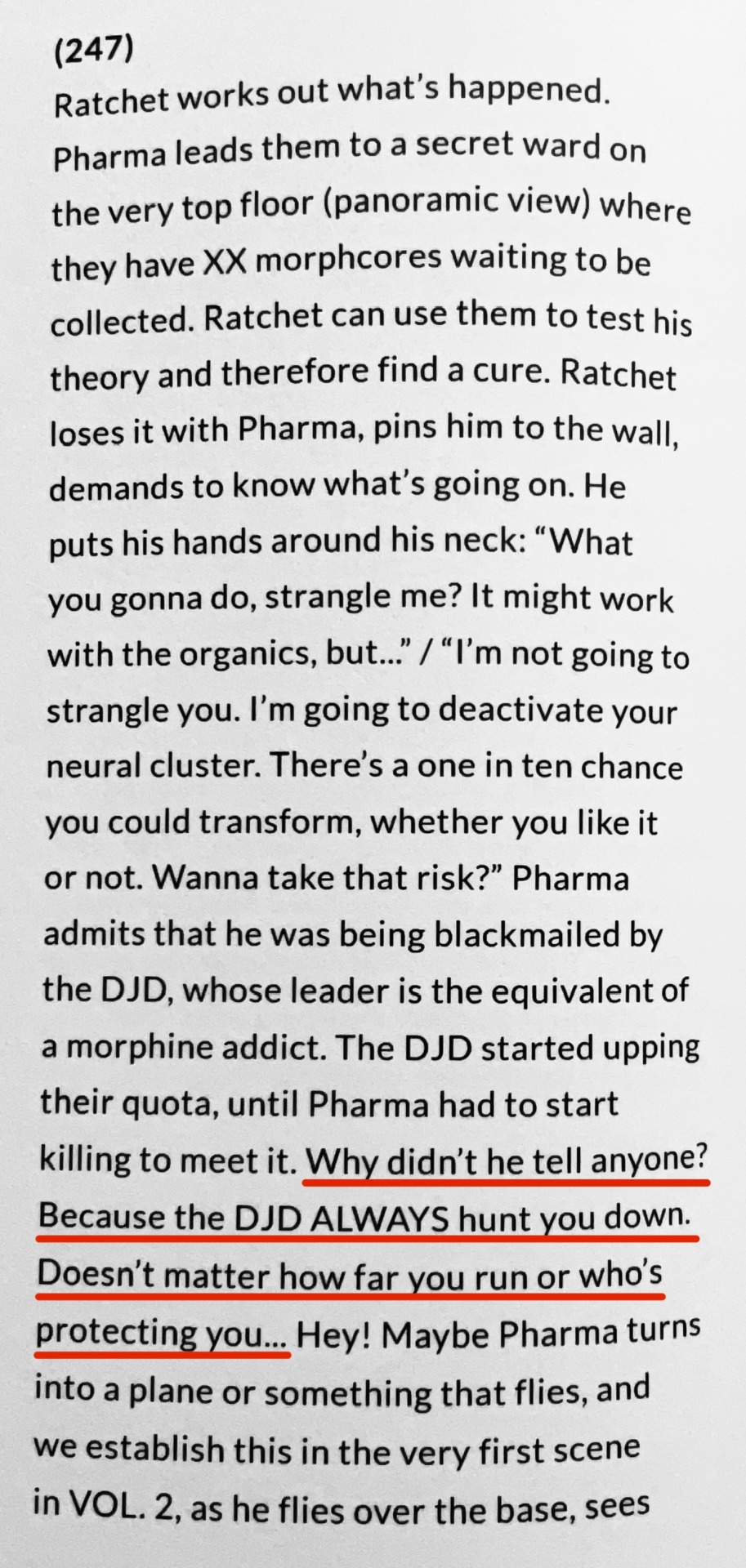
Simple as that. Pharma was aware of the scope of the DJD’s capabilities and relentlessness, and determined he was trapped prey.
Answer two (no word of god)
There are a few possible reasons Pharma didn’t call for help right away:
He was convinced all his other options would take too long and/or would still lead to him being put under suspicion. After all, being found to have harvested even a single T-cog from an already-dead patient for the DJD could have raised concerns that would lead to Pharma being investigated and/or having a mark put on his record.
He underestimated the severity of Tarn’s addiction, and was certain he could keep up with the T-cog demand without resorting to other means of harvesting, not realizing Tarn’s quota would increase later on.
He was already paranoid as a result of whatever mind games Tarn had set in motion at their first meeting, making Pharma think escape was futile.
Word of god or no word of god, there are clear reasons as to why Pharma ended up trapped. Most likely, it was a mix of all of the above.
Whatever was going on in Pharma’s mind before, he ended up in deeper trouble. Tarn increased his demand for T-cogs, and Pharma couldn’t keep up. By the time this happened, even if he had wanted to call for help, it was too late to do so without implicating himself. He reasoned his only option was to start killing patients to harvest their T-cogs.
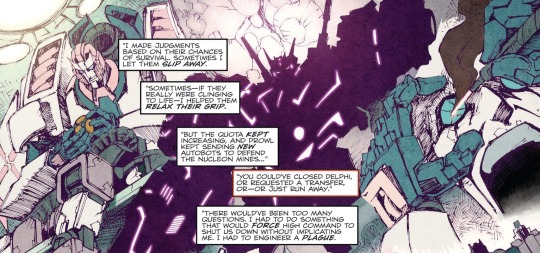
Soon, Pharma was so consumed with fretting over whether he’d be able to meet Tarn’s next demand that he didn’t have time or freedom to do anything else except worry and feel guilty. His whole life revolved around Tarn’s addiction; he was no longer in control, and could no longer enjoy whatever it was about Delphi he’d previously enjoyed. Perhaps the facility itself enabled Pharma to research cures and perform scientific miracles of medicine.
Being at the mercy of Tarn—convinced the DJD would find him no matter what—would have been pure psychological torture on its own, but also knowing that any small chance he did have of getting help would end in him losing everything would have added to his suffering. Pharma became desperate to reclaim control over his life and began planning an escape.
Now, JRO has said that Pharma didn’t originally plan to use the rust plague on the DJD…but canon says otherwise:

Of course, Pharma could have been lying to make himself look better in Ratchet’s view, but based on everything he’d been through up to this point with Tarn, it’s more likely he was telling the truth and had tried to eliminate the source of his suffering first. After all, wiping out the DJD would have been the simpler, cleaner option.
When the Duobots refused to detonate the soundbomb near the DJD, Pharma’s objectives shifted. He had to get Delphi shut down in a way that would:
Convince the DJD the shutdown was legitimate.
Pharma knew chances of escaping the DJD at all were slim to none, but he was desperate. Getting Delphi shut down would cut off Tarn’s supply of T-cogs and allow Pharma to escape Tarn’s immediate control, but the shutdown had to be “legitimate” to prevent Tarn from retaliating and hunting him down later. Leaving Tarn even the slightest chance of regaining control was too risky, so Pharma had to make sure his plan was as airtight as possible.
Cover up the patient murders.
If the truth got out about Pharma killing patients, he’d lose his medical license and most likely be put away for life. Being cut off from the practice of medicine and his intellectually stimulating work as a doctor would mean losing more than a job and a reputation. It would mean losing everything in which he’d anchored his sense of identity and life’s meaning. His refusal to consider any other options wasn’t just about ego and preserving his image as an excellent doctor; it was about preserving any kind of meaningful future he saw for himself.
Pharma needed a plan that would fulfill all of the above. Turning the engineered virus on the medical facility was the most effective and efficient solution. Anything else would have made him suspicious in the view of either Autobot High Command or the DJD, and neither of those would have ended well for him.
Because of his goal to preserve his reputation and future in medicine, he couldn’t even risk revealing anything to First Aid or Ambulon, who would have seen to his ruin. They became nothing more than loose ends that had to be tied up, and based on the fact that Pharma only prepared one vial of the vaccine, his original plan involved him being the only survivor:
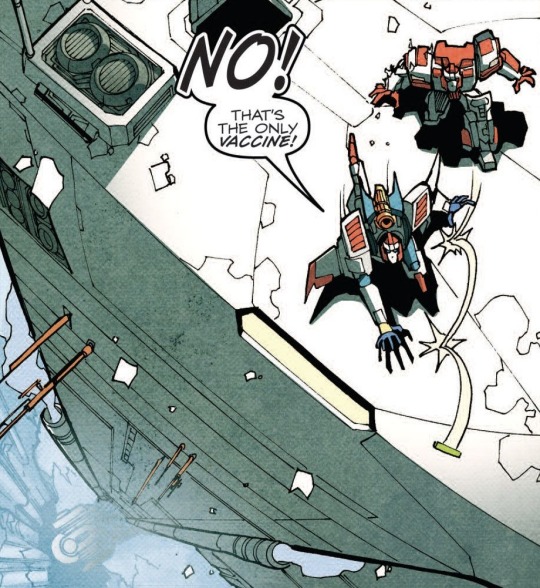
He probably would have had no problem making more of the vaccine for anyone else who survived, but he wasn’t counting on it. He wanted a totally clean slate; in letting his staff die with most of his patients, he would be getting rid of any and all evidence and reminders of his failures. He may have cared about First Aid and Ambulon before things got bad, but somewhere along the way, he decided either it wasn’t worth it to go through the trouble of finding a way to save them without raising suspicion, or he didn’t want to risk them putting together the pieces later on.
Of course, when Ratchet showed up, plans changed.
Ratchet
Ratchet is not the kind of person who seeks first to understand or be understanding. He’s inclined to trust what’s in front of him over anything abstract, and tends to look at the results of someone’s actions over trying to find any kind of ‘why’ behind them. Also, unlike Pharma, he operates from a strong moral sense, and reacts quickly and strongly when something or someone goes against that internal moral sense.
Ratchet’s reaction to finding out what Pharma did may seem hasty and harsh, but it makes perfect sense on a human level. There is no such thing as unconditional love; everyone has personal and moral lines (boundaries), and they’re different for each individual. When the most rigid of lines is crossed, that’s it; walls go up and the offender is cut off, no matter how strong the relationship may have been.
Ratchet obviously knew Pharma well enough to think he could try talking some sense into him, but then Pharma revealed that he’d crossed one of Ratchet’s lines: murdering patients. Any willingness Ratchet may have had to try to understand vanished. By the time Pharma started trying to provide a ‘why’ for his actions, Ratchet’s moral judgment had already shut down any chance of understanding what could have possibly led Pharma to kill patients. It didn’t help that Pharma seemed totally unapologetic and outright proud of his plan. For Ratchet, the ‘why’ didn’t matter anymore. What he saw was what he trusted, and what he saw was a friend who’d become his idea of a monster.
Now, Ratchet and Pharma’s relationship is one of the most confusing IDW relationships I’ve had the pleasure and pain of dissecting.
It is notoriously difficult to determine the depth and strength of a relationship from the outside. However, I’ve decided to go ahead and address it anyway because it has the potential to provide insight into Pharma as an individual.
If I were to sum up Pharma and Ratchet’s relationship in a single word, I would use “ambivalent.” The first time I read MTMTE, the thing that stood out to me most about their relationship was the drastic differences between how they each perceived the relationship.
In one sense, there’s the idea of Pharma basically being Ratchet’s crazy stalker ex, which is tossed around in fandom a lot. While I personally dislike seeing it regardless of context (yes, even as a joke), I do see how JRO’s writing choices set things up in a way that makes it easy to superimpose that trope.
In another sense, there’s the idea that Pharma and Ratchet were always close friends, and that what happened at the end of the Delphi story was a betrayal of both sides that came out of nowhere and whose consequences were taken too far.
I disagree with both. Personally, what I see at the end of the Delphi story isn’t an obsessed ex gone mad, a sudden betrayal, or a badly executed backstabbing. What I see is a breakdown of an already-complicated and poorly-maintained relationship: true feelings being revealed, long-repressed bitterness being forced to the surface, carefully-hidden cracks being split wide open.
Most people don’t have an accurate understanding of how much or how little they truly know the people in their lives, often overestimating how well they know a person until something surfaces and blindsides them.
According to JRO, Ratchet was oblivious to Pharma’s romantic interest, and throughout canon, it’s easy to see Pharma was more invested in the relationship than Ratchet ever was.
The question is, did Ratchet ever care about Pharma at all? And if so, to what degree?
Yes, Ratchet calls Pharma “buddy” and “friend,” but the former was sarcastic, and the latter means something different to each person. Also, in light of the circumstances, Ratchet could have just been saying “friend” in response to Pharma saying it—an emotional appeal more than anything.
However, Pharma must have been aware of Ratchet’s lack of relational investment because during the confrontation at Delphi, Pharma’s first reaction wasn’t to appeal to their friendship (ex: “But you know me!”). Instead, he appealed to their shared profession:
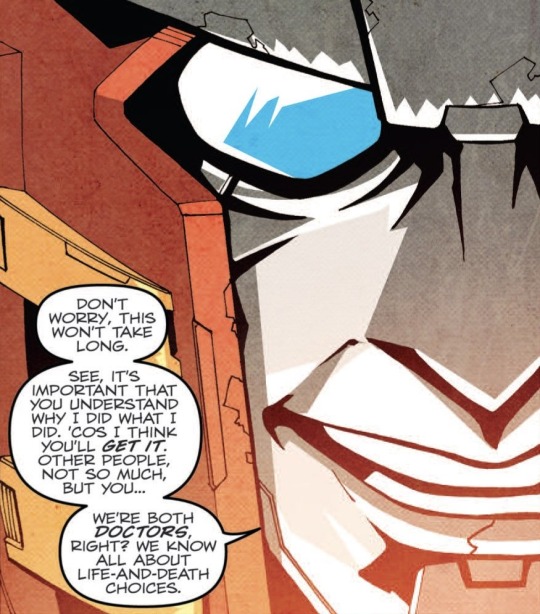
Then there’s the exchange of insults:
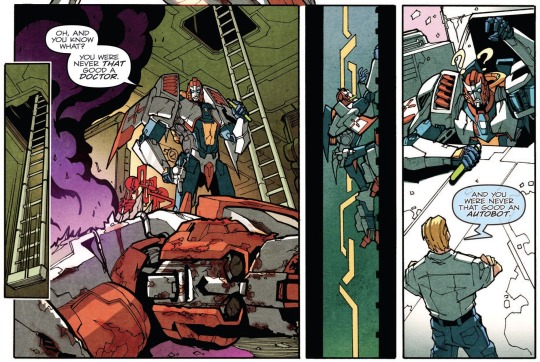
This is what I meant earlier by “true feelings being revealed.” Ratchet may have just been trying to match Pharma’s insult, but it’s unlikely it was merely reciprocal because while Ratchet is snarky at times, he’s sincere in that snark. There’s almost always some truth in his verbal jabs no matter how unserious they seem, and he’s never cruel for cruelty’s sake.
So, if Pharma saw Ratchet as an inferior doctor, and Ratchet saw Pharma as an inferior Autobot…it’s reasonable to assume there was always some deep-rooted competition and conflict preventing them from being super close.
Possible suspicion surrounding Pharma’s conduct as an Autobot paired with a tendency to misjudge the nuances of relationships could explain why Ratchet was so quick to decide Pharma was a lost cause. Maybe Pharma’s actions at Delphi confirmed something from the past that Ratchet had brushed off for whatever reason.
In any case, Ratchet seems to have been largely unaffected by the Pharma he found at Delphi. While leaving Messatine, he emphasizes that he’ll miss Pharma’s talent.

Not “who he used to be.”
Not “what we used to have.”
Just…“his talent.”
Later, on Luna 1, Pharma mentions that he and Ratchet were inseparable, but that could mean a few different things:
Best case scenario: Pharma and Ratchet sought each other out on equal terms.
Worst case scenario: Pharma followed Ratchet around.
Somewhere in the middle: the job forced Pharma and Ratchet to work in close proximity most of the time, and while Pharma intentionally ran into Ratchet more often than necessary, Ratchet also sought out Pharma every now and then.
Whatever the case, working with someone every day doesn’t tell you anything about who they are as a person, and the amount of time spent with someone doesn’t automatically correlate to how deep the relationship is or how well the people know each other. It’s not like either Pharma or Ratchet are shown to be good at expressing their personal feelings outside of extreme circumstances.
Ratchet does bring up late-night conversations of the past:

But while this indicates there was something deeper between him and Pharma, because neither of them were ever shown to be super open with their true feelings, it’s unlikely the conversations were full of touchy-feely talk. In all likelihood, the conversations were mostly medicine and war-related, with the rare spark-to-spark talk sprinkled in. Also, considering everything up to this point, one has to wonder if those talks ever meant anything to Ratchet, or if he was just digging for something that might stall Pharma’s torture.
Maybe those late-night conversations did mean something to Ratchet, but whatever the case, Pharma didn’t take the bait. He knew Ratchet was trying to stall by making an emotional appeal, and perhaps he was convinced the conversations hadn’t meant that much to Ratchet.
Looking at all of this, it’s hard to believe Ratchet ever cared about Pharma as more than an interesting work friend. But even if he had cared more than he let on, it wasn’t enough to overcome the doubts he had about Pharma’s character.
As for whether Pharma truly cared about Ratchet, I’m convinced he did, but in a mostly unhealthy way, and with a strong undercurrent of one-sided rivalry. At some point, Ratchet had been an equal and a source of challenge, and he probably listened to Pharma pretty often. It’s reasonable to assume Ratchet was one of the only people—if not the only person—able to handle Pharma’s intense temperament and challenge him in a meaningful way, providing some semblance of friendship for Pharma.
However, one last thing that stands out is that, when telling Ratchet why he’s torturing him, Pharma didn’t say anything like, “Because you hurt me” or “Because you turned against me—your friend.” Instead, he said it was for “ruining things at Delphi” and because “you declared war on my body.”
Either Pharma wasn’t being entirely honest, or Ratchet’s friendship didn’t mean as much in the first place as he’d previously implied. It’s possible the ‘Because you hurt me’ was implied in “for ruining things back at Delphi,” but why not say it outright? Perhaps it was a fear of vulnerability and admitting there was ever a relational need at all.
At the end of the day, it’s difficult to say for certain how close Pharma and Ratchet were, but it’s clear they were never on the same page and there were always barriers between them.
Luna 1
Revisiting the matter of Pharma’s morality taking a backseat to other priorities, his time on Luna 1 further underscores this. Again, Pharma chooses his battles and is unwilling to put himself at great risk for the sake of others, but a closer look at the situation with Tyrest reveals there wasn’t really anything he could have done for the Cold Construct population even if he had wanted to. It would have been him against Tyrest, an army of Legislators, and a bunch of Decepticons. Pharma knew his limits, and seeing as his goal was self-preservation, it was perfectly rational for him to go along with Tyrest’s grand scheme.
Besides, it doesn’t look like he was given much of a choice:

Although, knowing Pharma, he still would have demanded to know beforehand what he would get in return for the pain, and evidently, Tyrest held up his end of the deal since Pharma had access to the Luna 1 tech collection.
As for Tyrest’s plan to wipe out the Cold Construct population, there’s nothing indicating Pharma’s decision to turn a blind eye to it was rooted in malevolence or bigotry—just rational apathy: ‘I can’t stop Tyrest, so why concern myself with the outcome?’
Again, you can’t save everyone; Pharma had all he could do to save himself.
But it wasn’t all horrible. I would even go so far as to say Pharma found some happiness on Luna 1. Tyrest didn’t care about him, but he didn’t need Tyrest to care. Everyone else there hated him, but he didn’t need to feel like he belonged or was admired. At this point, Pharma’s only interest was Tyrest’s Luna 1 tech collection, and that meant playing nice so he could keep his reward. Back at Delphi, he probably assumed he’d never again practice medicine the way he’d loved; being brought to Luna 1 was an unexpected, yet welcome, second chance.
Even so, Pharma had his moments of cruelty. Back at Delphi, he had easily-identifiable reasons to kill patients—both the ones whose T-cogs he harvested and the 20 more he tried to kill when he shot the life support machine. But on Luna 1, he had no reason to be cruel, yet he chose to be. By this point, he’d mastered the ability to almost completely ignore or subdue his conscience.
In the case of Ratchet’s torment, one could argue Pharma only drew it out for retaliation purposes; it was personal for him.

As for cutting Ambulon in half, it was obviously meant to be as gruesome as possible, yet also quick. But personally, I don’t think it was about Ambulon; it was more about hurting Ratchet. Due to the fact that Ratchet’s identity is wrapped up in his compassion and his ability to be helpful as a doctor, one of the most effective acts of revenge would be to do something that makes him feel utterly helpless.
Also I wonder if, subconsciously or consciously, Pharma was attempting to recreate the sense of helplessness he felt back at Delphi under Tarn’s watch: “Do you see, Ratchet? Do you now understand how it feels to have control ripped out of your hands? To be totally helpless?”
Next, for some reason, Pharma was invested in the promised execution of Getaway and Skids:

He had no personal connection to either of them that would give him a reason to be interested, so maybe Tyrest told him he could perform the execution and/or have the corpses for medical experimentation. Either way, Pharma would have had a chance to use some of the tech in Tyrest’s tech collection, possibly explaining his excitement.
Of course, any chance of an execution disappeared when the final showdown went wrong.
When Pharma tried to escape to Cyberutopia and discovered he couldn’t pass through the spacebridge forcefield, he gave up. He’d been caught; he would no longer have access to Tyrest’s tech collection; Ratchet and every other self-righteous Autobot would never forgive him; and the morality lock prevented him from escaping. By all appearances, he would never again be able to engage in that which gave him a sense of meaning. He had shrunken his world down to his obsessive interest in a specialized field and one significant, yet unrequited relationship. With both of these lost, his world collapsed.
Yes, guilt played a part in Pharma’s despondency, but because he seems to have been in denial of said guilt, it’s more likely his despair was primarily due to the fact that he saw no future for himself. He had nothing left to live for.
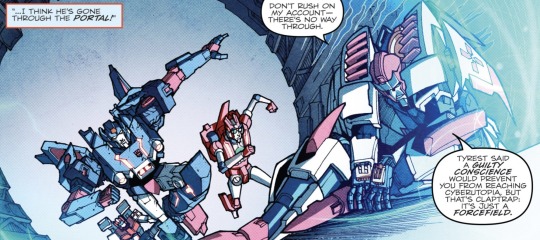
In light of this, Pharma’s flippant comments to First Aid make sense. He wasn’t being insensitive as much as he was goading First Aid. Pharma’s not stupid. First Aid had a massive rotary cannon on him, and Pharma knew exactly which emotional buttons to push to get him to pull the trigger.
Pharma wanted to die.
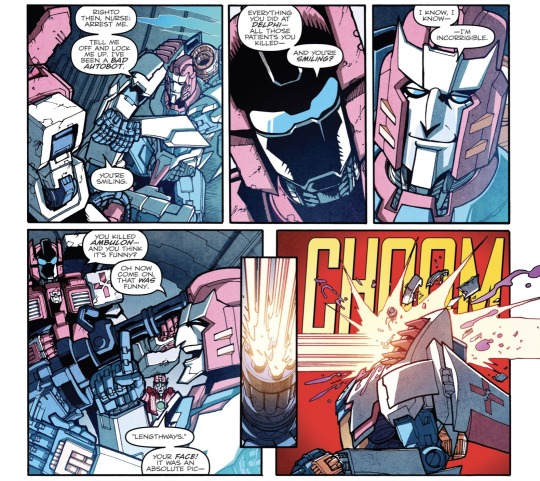
Adaptus
First, let me emphasize that Adaptus did not take possession of Pharma’s body. Instead, Pharma was the unwelcome guest:
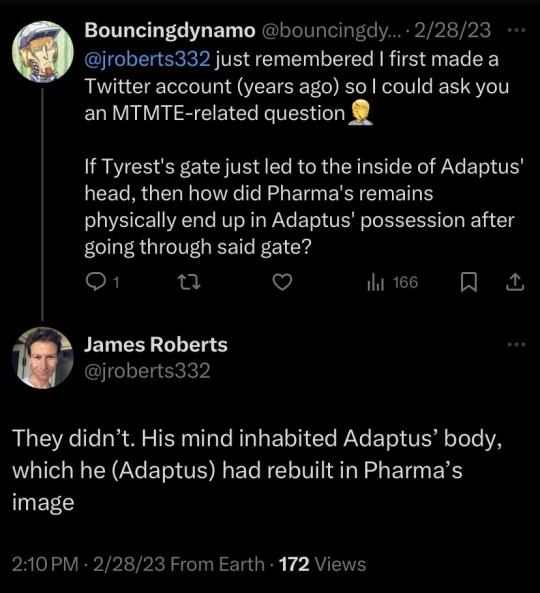
How Pharma ended up in Adaptus’ new body is a mystery, but whatever the case, Pharma didn’t pass on to the Allspark. Whether or not he had a choice can only be speculated.
First Aid had blasted Pharma’s head clean off, so whatever happened must have been related to the spark. Perhaps some residual spark energy was trapped in a body part that Adaptus repurposed, leaving Pharma tethered to the new body unwillingly.
Still, Pharma managed to assert his will and override Adaptus for a brief moment. Considering Adaptus was basically a god, this is impressive.
Based on Adaptus’ surprise at being interrupted, it seems he didn’t know Pharma was there. Why Pharma hadn’t tried to assert himself sooner is a mystery. Maybe Adaptus’ scheme was entertaining; maybe Pharma actually liked the company; or maybe he’d been waiting for an opportunity to get revenge on Tyrest for everything done to him back at Luna 1.
Sure enough, just like with Ratchet back on Luna 1, Pharma’s vengeful streak came out as soon as there was an opportunity.
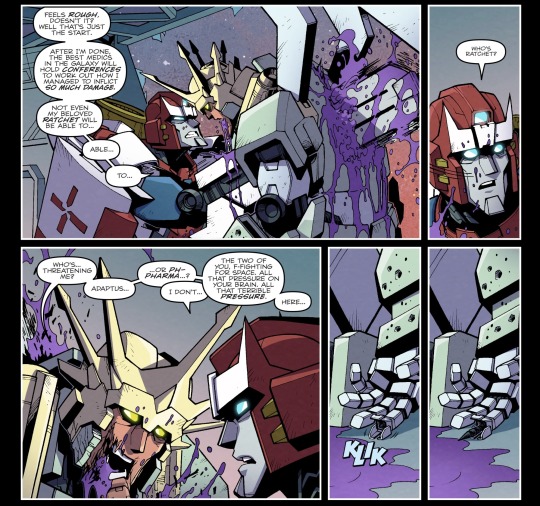
Unfortunately for him, this left him vulnerable, and Tyrest took advantage of the confusion:
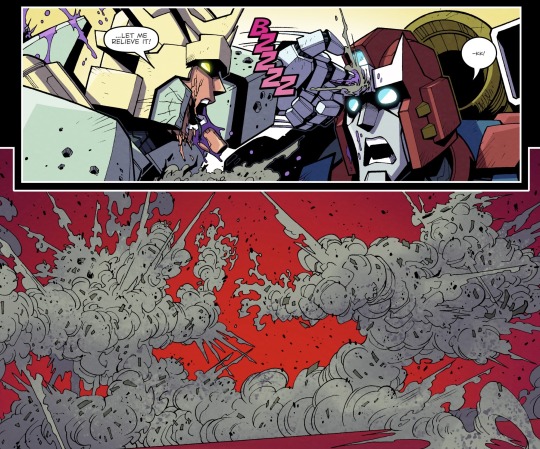
Conclusion
When someone reduces their world to narrow personal interests and one or a few very special people, their grip tightens around what little they have. They often become obsessive and possessive of the few things that make them feel alive, and their view of the world becomes increasingly more subjective and detached from the outside world. Pharma seems to have fallen into this trap.
Even so, in the context of the circumstances, several of the decisions he made were rational—even if coldly so. Oftentimes, “extreme” rationality and self-preservation are villainized in fiction, and characters like Pharma who don’t automatically put themselves at great risk for anyone and everyone are villainized, or at least looked down on. Their choices are often regarded as less human, but rationality and self-preservation are just as human as compassion and self-sacrifice.
Ultimately, Pharma was trapped and pushed over the edge into “insanity” by Tarn’s cruelty, but his own choices made from a place of pride determined how he fell, and how far he fell. It was a perfect storm of Tarn’s mind games and Pharma’s intellectual arrogance, excessive self-confidence, obsessive nature, and stubborn grip on the kind of future he wanted for himself.
Pharma is yet another Icarus who flew too close to the sun and paid dearly for it, and while JRO/the narrative could have given this Icarus better wings, that doesn’t change the fact that he chose to fly so high.
***
Many thanks to anyone who made it to the end of this monster of a post.
-tosses a Rodimus Star at you-
#look who finally finished this thing#idw transformers#idw1#maccadam#MTMTE#lost light#idw pharma#pharma#tf idw character analysis#tf idw meta#dr. fancy hands#nova’s nerding out again
580 notes
·
View notes
Text
this is so insane because like... the little things that just felt off, but i didn't think about for long because it was just a moment in the story and the story keeps moving...
when lindy immediately blocked the doctor but spoke to ruby
the way the "pioneers" spoke about fighting and taming the "wild woods", just like their ancestors (and i'm sorry but in classic who this kind of statement would NOT complicate a protagonist figure at all)
these turned out to go right to the core. they didn't have to spell it out. it was so clear the moment i realised, the moment i saw the way lindy looked at the doctor in person - oh my god, theyre all white.
and the dot "learned to hate them" (big hmmm)
these aren't metatextual criticisms anymore. they ARE the text.
i want to say i am proud of this show for getting to this point. and i would argue the point was made effectively, even elegantly. but that's coming from me, a white person, talking about a script written by RTD, another white person. it felt like it spoke to ME. it felt like it spoke to ITSELF (the show, rug-pulling itself, setting itself apart from its own racist history and a certain large subset of science fiction)
there is a lot to unpack in the real world, even just within the production of this show, about diversity and whose voices get heard and the material reality of it all. i will be listening because i am sure people will have a lot to say.
1K notes
·
View notes
Text
Something about Vegapunk using the dna and blood of a caged and experimented on child to create more caged child experiments and the cycles we perpetuate.
Because what does it mean that all that King has left as proof, that the lunarians were real, that they existed as a tribe, as a people, are seven manufactured children he doesn’t even know about, enslaved as weapons to the government that wiped out the culture they’ll never get to be a part of, and Alber himself another enslaved child lost to something he’ll never fully know.
And what of the warlords? Already young once and hurt by their government, young again and slaves to it. Boa looking at a version of her practically pulled out of time stuck in her worst nightmare or Jimbei looking at a version of himself living out a past he escaped by the skin of his teeth but so many he loved didn’t, even Doffy once again at the mercy of the people that already abandoned him, has Kuma not suffered enough? Given enough, is this child version of him doomed to repeat the same path he already could not escape from . Property of the world government, beholden to the celestial dragons, this version of me that cannot go free?
It’s interesting that Vegapunk joined the government so that he could do the most good, but look at the long line of people right infront of him that he’s hurt with his own hands.
#god I did not mean for it to be this memo dramatic but I have alot of feelings about the seraphim#again I don’t think Vegapunk is a bad man he’s blinded by the greater good tho and his own thirst for knowledge#and while I’m sure that his invention did some good the flower pellets for one does that really erase the bad?#is he responsible or can he be held accountable for the good or the bad#but Vegapunk plays fast and loose with who he sees as humans#the other vegapunks while he acknowledges them as really just extensions of himself he treats them like people#same with stussy who is also a clone#but there is no humanity for the seraphim even tho they seem to feel more than the average pacifsta he treats them strictly as robot weapon#it’s strange and niche how he goes about classifying this in his head maybe it’s the only way he knows to live with it#because if the seraphim where children and he handed them Off to the government to become murderes and weapons of mass destruction#what would that say about him?#one piece#throwing thoughts to the void#dr vegapunk#vegapunk#warlords of the sea#7 warlords#boa hancock#jimbei#bartholomew kuma#donquixote doflamingo#seraphim#seraphim one piece#king one piece#alber one piece#king the wildfire#lunarians#op#one piece meta#one piece analysis
406 notes
·
View notes
Text
Everyone wants to see Billie Piper or Jenna Coleman return as a future incarnation of the Doctor and I get it but hear me out…
What if they return as the master instead? 👀
Is wearing the face of a lost friend that the doctor had pseudo-romantic tension with to guilt/torment/ manipulate the doctor not exactly something the master would do? That’s kind of just their whole deal already really, this would just be that little EXTRA bit fucked up.
#and we all know the master is ALWAYS a little extra ;3#am i right?#doctor who#dr who#dw#doctor who fandom#doctor who meta#the master#thoschei#rose tyler#clara oswald#billie piper#jenna coleman
374 notes
·
View notes
Text
Interesting that the Doctor says his adopted family is the reason he uses a title. Except thats not quite true is it?
Sure they are stuffy aristocrats who love ranks and titles but Tecteun, Rassilon, Borusa, Romana, Pandad, Andred, Rodan, Darkel, Flavia, and practically every other non-renegade timelord (and even some renegades like Drax) still use regular (if not human) names.
But you know who does often use titles? THE GODS. Those from before or beyond the universe's constraints. The Toymaker, The Guardians, The Maestro, The Trickster, The The Beast, The One Who Waits, The Gods of Ragnarok, The Entity, etc. Even those with 'names' often have descriptive ones like Time or Swarm.
Is it really the Doctor's adopted family that made them identify with titles? Or is it perhaps traces of their 'birth family' peaking through?
More than anything I just want to know if RTD is going anywhere with this. Did he just need a quick way to get new audiences on board with calling the main character the Doctor? Or does it mean something.
#this is not particularly researched btw i am just grasping at straws because rtd BESTIE what are you on about with this#i am on board with eldritch horror doctor tho :)#doctor who#dw spoilers#spoilers#dr who#season 14#series 14#fifteenth doctor#15th doctor#dw meta#dw speculation#the timeless child#timelords#space babies#also the doctor started of the renegade title game by calling themself the other. i said what i said
504 notes
·
View notes
Text
I feel like people really underestimate the importance of Dick being the first Robin. Like, reverse Robin AUs are interesting and such, but I just hope people realize that in the context of canon, they would never work. The reason Batman and Robin ever works is because the first Robin was Dick Grayson specifically. Because Bruce would never have taken in any child if Dick's tragedy hadn't specifically happened to mirror his own experience. Dick Grayson was the only one Bruce truly saw himself in first, because the fundamental event that defines them is the same. And he sees the opportunity to help someone the way he was never helped, to make sure that Dick didn't go down the dark path he did. So, my point here is that the only one Bruce actually made the choice to take in, the only one who could kickstart it all, is Dick Grayson, because he is the only one with whom Bruce could immediately empathize and connect with.
This never happened with any other Robin. He took in Jason because he missed Dick, he took in Tim because Tim forced himself into the role, he took in Steph because he was trying to make Tim come back to being Robin, and Dick made Damian Robin. Of course, he loved all of them, and they all have their unique relationships with Bruce that are very important and inform their characters, and he does need them too. But he specifically formed this connection with Dick that made Dick the only person he ever considered taking in. It took a very specific set of circumstances in Dick's backstory that made Bruce commit an impulse adoption that just isn't really present in any other Robin's story. And the reason Jason or Tim or Steph or Damian or anyone else whom Bruce has taken under his wing even got that chance is because of the work Dick Grayson put into Bruce Wayne.
Before Dick, Bruce was reckless and didn't care at all about himself, to the point of almost being borderline suicidal. He was more brutal, more violent, etc. The reason all this changed, is because of Dick Grayson specifically. He was the one with whom Bruce opened up, with whom Bruce was forced to grow up, to take responsibility and learn to take care of both Dick and himself. Dick, to Bruce was the one who brought "color to their [his and Alfred's] monochrome lives." Dick Grayson's specific brand of happiness and joy changed Bruce for the better. Dick gave Bruce hope. This is true for other Robins too, but only because they followed the precedent that Dick Grayson set, only because they slid into his role (they have their own interesting relationships with Bruce, but this specifically is from Dick that other Robins carried on. A legacy, if you will). Dick Grayson turned Bruce into the kind of man who would become a serial adopter.
Without his influence, without his precedent, there would be no Batfamily, because Bruce would never have gotten to the point where he would be able or willing to take in someone else and care for them properly (It took living through his trauma again to get him to take Dick in lmao). Hell, there would be no Batman because Bruce would have gotten himself killed a long time ago if Dick hadn't helped him learn self-care. Dick knows Bruce best, because he understands him on a fundamentally deeper level than anyone else in the world. And he's the only one who can make Bruce open up at his rawest, most downtrodden state. He is the only one who can give Bruce at his lowest that kind of hope. There is no Robin without Dick Grayson. It's literally a tribute to his parents, using their colors and the name his mother called him. He created that identity as a symbol of hope. He helped Bruce become the kind of man who could and would let other people that he had to care for into his life. Without Dick Grayson, you can simply forget about any other Robin or the Batfamily as a concept even existing.
#DC#DCU#DC Comics#Bruce Wayne#Batman#Dick Grayson#Jason Todd#Tim Drake#Stephanie Brown#Damian Wayne#Nightwing#Red Hood#Red Robin#Spoiler#Robin#The Batman 2022#Robin I#My meta#Meta#TL;DR Dick Grayson is the only one who is emotionally intelligent enough to be an emotional crutch to pull Bruce Wayne out of the darkness#And without him Bruce never would have taken in anyone else#This post is mainly about The Batman 2022 btw#I see a lot of people asking for Robin but they want Jason to be the first Robin for some reason#And that's interesting but Bruce doesn't need just a Robin. He needs Dick specifically#That's what's best for his character progression and it makes the most sense from a thematic perspective too#But that's for another post
573 notes
·
View notes
Text
I do think they kind of shot themselves in the foot when it comes to the events of Sonic Forces, not because they were bad ideas or even because they were poorly-executed, but because of how it necessitates a change in character dynamics that Sega isn't willing to let happen.
Sonic canon is now existing in a time where Eggman's succeeded in taking over most of the world before, along with imprisoning Sonic for, and I need to emphasize this every time I mention it, six months straight. If Sonic's going to be jokey and casual with Eggman after that, then we need to be able to tell that it's something of a front that he's putting up, or else the character continuity makes no sense.
Recall how, in Adventure 2, Sonic would mock Eggman a bit when he thought he had the upper hand with the fake Chaos Emerald, but not because he wasn't taking him seriously as a villain. He knew that the situation was tense, he was talking big just because that's his personality.
Also recall how he completely dropped the humor whenever things got really bad. Well, he's seen things get pretty much as bad as possible in Forces, all because of Eggman, and I just can't buy the casual nature of their interactions in Frontiers because of it. No matter how casually Sonic acts around him, it's gotta be clear that he doesn't feel comfortable with him. And as entertaining as their dialogue in Frontiers is due to that vibe, it's out of character at this point in the timeline.
Yes, Sonic was the same way with him during Forces. But Frontiers was fully willing to let Tails have more serious, grounded feelings about what happened in Forces, so why not Sonic?
And seriously, what's with this trend of letting literally everyone but Sonic experience residual effects of Forces? Tails shows lasting guilt/anxiety regarding Infinite's first attack in both the games and the comics. And in those comics, the Restoration is all about rebuilding the world after the war, pretty clearly being shaped by their experiences. Meanwhile, Sonic mentions his imprisonment exactly once, and it gets brushed aside immediately.
I understand that Sonic wouldn't want to talk about it, but at a certain point, he doesn't really need to. A shift in how seriously he takes Eggman as a threat, showing his distrust whenever possible, would easily be enough to get the point across. Maybe make a point about him being a little antsy in tight spaces or something (which is the same way Forces communicated the effects being captured had on him, by the way).
And honestly, Eggman should feel a little different, too. He's now someone who's come so close to complete world domination and still lost, I feel like we should be seeing... I dunno, something. A different edge to his hatred for Sonic after such a monumental failure, maybe. Anything to show that Forces mattered at all to the major players involved.
Like, I don't think I'm asking for much here. If we can shake up the status quo of the series by allowing Eggman to be an Actual Dad with a Child, we can allow Sonic and friends to treat him as a legitimate threat who can't be trusted. But nooo, Eggman has to be silly enough to continue the Brand Image, which means that Sonic doesn't even get to have retroactive character development like Tails did
#sonic the hedgehog#sonic forces#sonic frontiers#dr eggman#analysis#meta#Thought about this after rewatching some Frontiers cutscenes and realizing they were a little too. chummy#I'm not someone who dislikes seeing them portrayed that way but they GOTTA consider the context they're working with
263 notes
·
View notes
Text
There was a lot of things I loved about that episode, and roughly a billion references to older canon, but I'm always gonna hook onto the weird obscure stuff.
Specifically the shit about the Guardians.
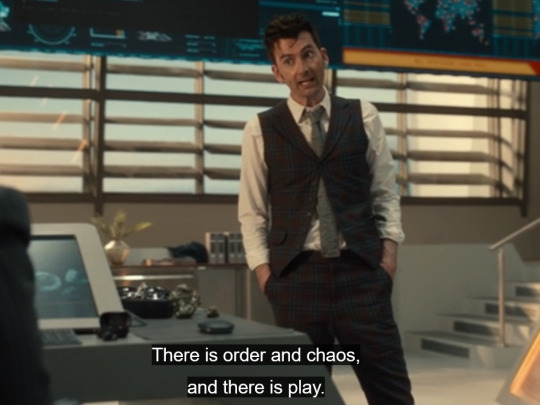
Cause yes, on-screen we've had the White Guardian (order) and the Black Guardian (chaos). Yes they have birds on their heads don't worry about it.
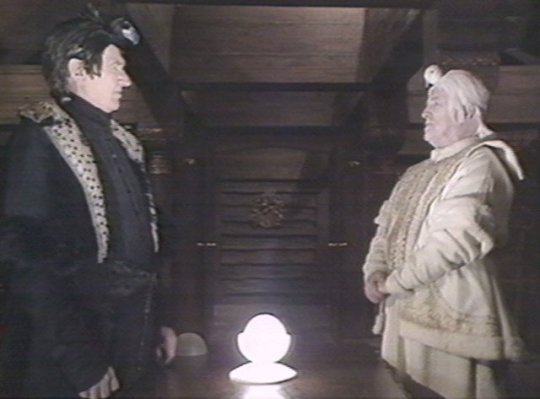
But like he says, THERE IS PLAY. Because there's also sources saying that the Celestial Toymaker is the Crystal Guardian. Dreams and imagination, another dimension of the universe. (It's never great for the universe when any of these guys show up in physical form.) The Toymaker himself claims that he and the other guardians are Great Old Ones from the pre-universe.
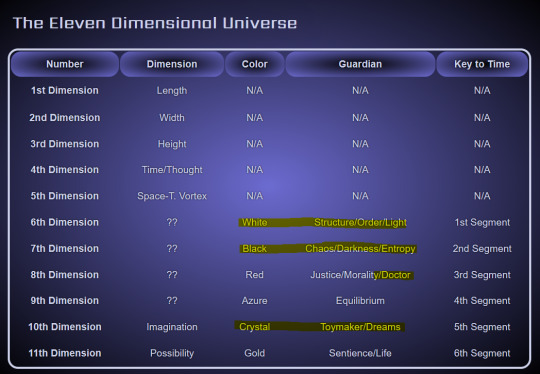
(Google "rassilon omega and that other guy" to find the source for this, a deeply comprehensive timeline of the entire whoniverse.)
WHICH IS EXTRA INTERESTING given you then get this line from the Toymaker:
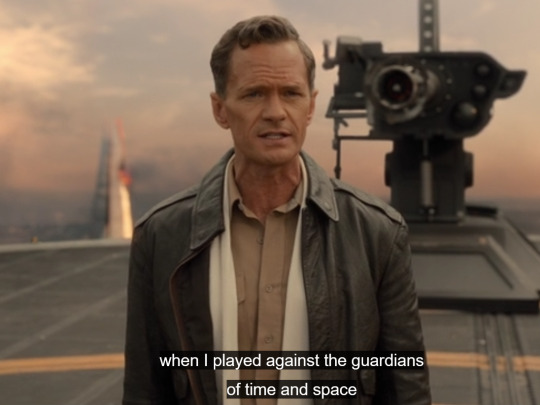
Note that there are no guardians of the spacetime dimensions. The "Guardians of Time" refers to Black/White, and possibly the others.
You may notice the Doctor is also on this list, as the Red Guardian of justice and morality. Which is all I could think about for this:
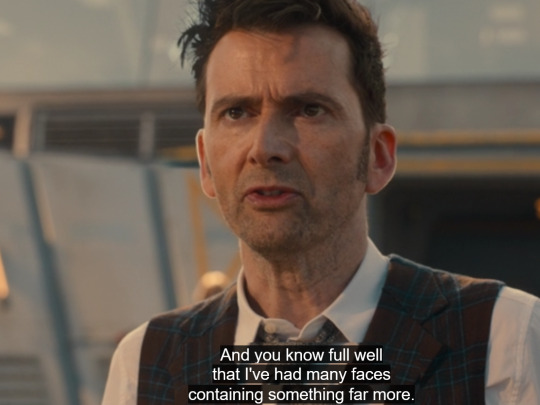
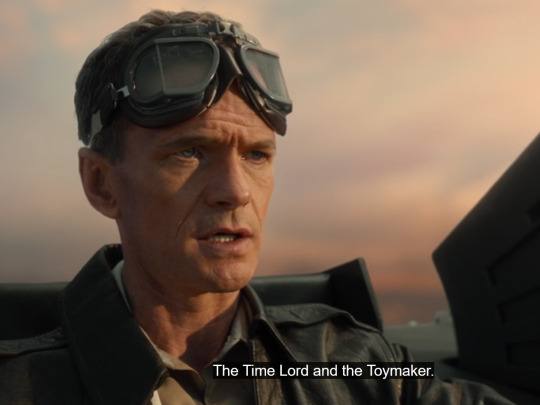
((PS: This also ties in with the slightly more bonkers theory that the Doctor is themself a Great Old One, specifically Nyarlathotep. There's basis for this in some books, but that's a whole nother thing.))
Given the context we now know from the Timeless Child being reaffirmed, there's just something meaningful about "THE Time Lord" in connection with the Toymaker and the Guardians.
Especially given several accounts say the Great Old Ones were from the previous universe, and were the equivalent of Time Lords in that universe.
Which ties really interestingly into Tecteun's claim that the Doctor was from the next universe, and wanted to go there with them.
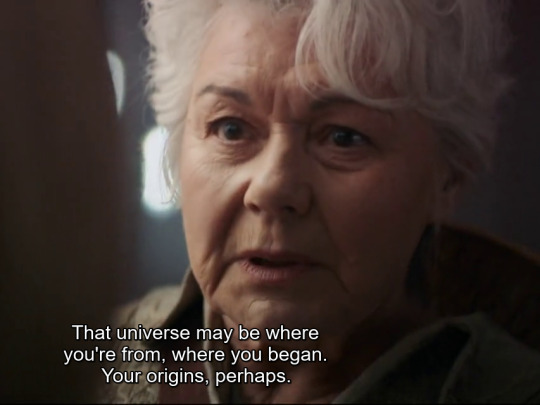
So anyway yes the Doctor is a traumatised lil bean just trying their goshdarn best.
And they're also a "face concealing a vastness that will never cease" like the Toymaker.
Cause that's also the show. A vastness that will never cease.
#dw meta#doctor who#the giggle#the toymaker#the black guardian#the white guardian#guardians of time#fourteen#thirteen#tecteun#great old ones#dr nyarlathotep#thanks for coming to my ted talk
574 notes
·
View notes
Text
Clara Oswald as a character is wonderful and incomprehensible to me because Moffat really spent several years demonstrating his complete inability to write a woman who acts like a human person and then wrote in a woman whose primary character trait is her complete inability to act like a human person and absolutely nailed it. is this a long con? is it method acting for writers? does this cringegirl queen know that I would die for her?
#doctor who#Clara Oswald#twelfth doctor#eleventh doctor#meta#steven moffat#new who#12th doctor#11th doctor#Dr who
131 notes
·
View notes
Text
Dad sent me this XD

#dw#dw spoilers#dw 05#dwedit#ruby sunday#doctor who#doctor who 2005#doctor who spoilers#doctor who tardis#doctor who series 1#doctor who fanart#doctor who meta#doctor who the giggle#fifteenth doctor#nuwho#dr who#15th doctor#the doctor#ncuti gatwa#millie gibson#the fifteenth doctor#sutekh#the legend of ruby sunday#the tardis
197 notes
·
View notes
Text
ok ok ok.
ruby haunted by herself (the narrative)
she is what she looks like. (blurry. a signal. alone.)
"are you having a good time?"
some kind of afterlife where the unfinished business creates itself
all she could do was make people run and hide and sever the cords of their life (she did it to herself) so she turned that unbreakable story into one small monumental victory (that no one else would ever know) while enduring alongside her ghost the loneliest life of her own creation.
it never snowed again after the doctor disappeared. rest in peace mad jack. she never found her birth mother but she always found herself, alone, always
the stories ruby absorbs and reintegrates into reality have a bad-dream logic. the story by nature is not real (the signifier alone) but we experience it anyway (we become the signified?). the worst possible outcome was always already happening. we see something inexplicable and weave rules to govern it.
the story took a branching path it was never/always meant to take so ruby had to spend her life rewriting it. the only weap(e)n she had was herself
ASK HER. ASK HER
371 notes
·
View notes
Text
The secret history subtly deals with the theme of education and the different ways one could learn and could teach things. The motto of Hampden is "learning by doing" which is itself a teaching methodology theorized by John Dewey (it is still seen as a valid method, especially in stem contexts).
Julian is like a Greek rhetorician. He is able to persuade his six students merely by discussing philosophy and other things they like so much. He is a master of the word, which is at the same time clear to the group but also, it isn't. He conditioned the group's actions and lead them to do what they did. Julian already chose Henry as his successor, in a way. He knows that Henry also has an "aura", an empathetic strength which makes him both alluring and scary at the same time.
Dr. Roland is a psychology professor. Psychology is the science of the inside, and is so akin to philosophy because psychology tried to give answers to the matters of the mind and the emotions and the human being that philosophy used to ponder about. It is stated several times that Dr. Roland is a behaviorist, and they believed that learning could be achieved through conditioning. He talks a lot, but in the end, we see that what he says never influences Richard that much. Richard only sees Roland as his way to earn money while in a shitty town, but we see that he is just a random professor who leads a very ordinary life in comparison to Julian's life.
Richard uses Dr. Roland to get an income to sustain himself, while he attends Julian's classes. After Bunny's funeral, the group slowly falls apart and Richard finds solace in solitude in Dr. Roland's office rather than in Julian's classes with the members of his clique. This is a consequence of learning by doing, where the learning is questionable and brings about traumatic consequences for Richard and the others. He has to live with the consequences of their actions and he isn't okay with that, but he has to bear that cross since he feels a sort of sick loyalty to the others even though they never completely welcomed him in their group. He also knows that perhaps, if he isn't careful, he might be the next Bunny because he now knows too much
#the name julian is also a nod to julian in ancient rome who was a pagan while dr roland is a nod to roland of the chanson de roland#this is truly a book for the humanities nerds like myself bc there are a lot of references to other stuff#the secret history#tsh donna tartt#tsh#tsh meta#donna tartt#richard papen#henry winter#camilla macaulay#charles macaulay#francis abernathy#bunny corcoran#my posts 4
100 notes
·
View notes